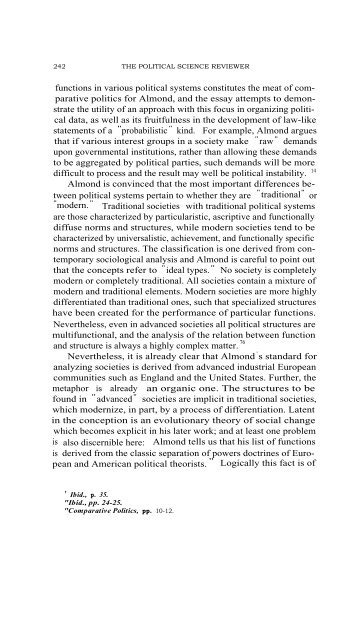FUNCTIONALISM AND ITS CRITICS - Intercollegiate Studies Institute
FUNCTIONALISM AND ITS CRITICS - Intercollegiate Studies Institute
FUNCTIONALISM AND ITS CRITICS - Intercollegiate Studies Institute
Create successful ePaper yourself
Turn your PDF publications into a flip-book with our unique Google optimized e-Paper software.
242 THE POLITICAL SCIENCE REVIEWER<br />
functions in various political systems constitutes the meat of comparative<br />
politics for Almond, and the essay attempts to demonstrate<br />
the utility of an approach with this focus in organizing political<br />
data, as well as its fruitfulness in the development of law-like<br />
statements of a " probabilistic " kind. For example, Almond argues<br />
that if various interest groups in a society make " raw " demands<br />
upon governmental institutions, rather than allowing these demands<br />
to be aggregated by political parties, such demands will be more<br />
difficult to process and the result may well be political instability. 14<br />
Almond is convinced that the most important differences between<br />
political systems pertain to whether they are " traditional " or<br />
" modern. " Traditional societies with traditional political systems<br />
are those characterized by particularistic, ascriptive and functionally<br />
diffuse norms and structures, while modern societies tend to be<br />
characterized by universalistic, achievement, and functionally specific<br />
norms and structures. The classification is one derived from contemporary<br />
sociological analysis and Almond is careful to point out<br />
that the concepts refer to " ideal types. " No society is completely<br />
modern or completely traditional. All societies contain a mixture of<br />
modern and traditional elements. Modern societies are more highly<br />
differentiated than traditional ones, such that specialized structures<br />
have been created for the performance of particular functions.<br />
Nevertheless, even in advanced societies all political structures are<br />
multifunctional, and the analysis of the relation between function<br />
and structure is always a highly complex matter. 76<br />
Nevertheless, it is already clear that Almond ' s standard for<br />
analyzing societies is derived from advanced industrial European<br />
communities such as England and the United States. Further, the<br />
metaphor is already an organic one. The structures to be<br />
found in " advanced " societies are implicit in traditional societies,<br />
which modernize, in part, by a process of differentiation. Latent<br />
in the conception is an evolutionary theory of social change<br />
which becomes explicit in his later work; and at least one problem<br />
is also discernible here: Almond tells us that his list of functions<br />
is derived from the classic separation of powers doctrines of European<br />
and American political theorists. " Logically this fact is of<br />
' Ibid., p. 35.<br />
"Ibid., pp. 24-25.<br />
"Comparative Politics, pp. 10-12.
















